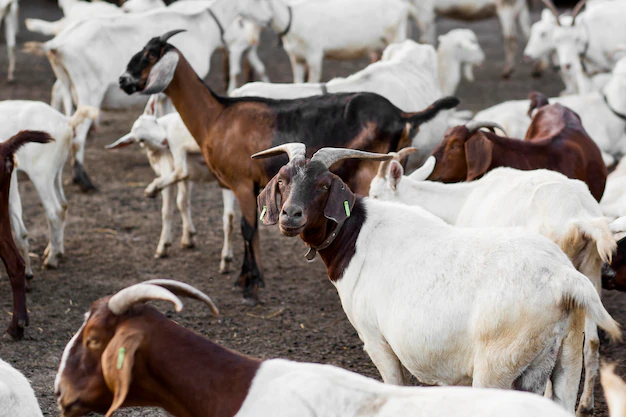Sustainable goat farming in South Africa involves the responsible management of goats for the production of meat and dairy products like cheese. It requires a holistic approach that takes into consideration the well-being of the animals, the environmental impact, and the economic viability of the farm. Here are some key aspects to consider when practicing sustainable goat farming in South Africa:
- Breeding and Selection: Start by selecting goat breeds that are well-adapted to the local climate and conditions. Indigenous South African breeds such as Boer goats or Kalahari Red goats are popular choices for meat production, while Saanen or Toggenburg goats are commonly used for dairy production. Choose goats with good health, fertility, and production traits to ensure a strong and sustainable herd.
- Grazing and Pasture Management: Implement rotational grazing practices to prevent overgrazing and maintain the health of the pasture. This involves dividing the grazing area into smaller paddocks and regularly rotating the goats to different sections. It helps to prevent soil erosion, promotes the growth of nutritious forage, and reduces the risk of parasite infestations.
- Feeding and Nutrition: Provide a balanced diet for your goats to ensure optimal growth, milk production, and overall health. Fresh, clean water should always be available. In addition to grazing on pasture, supplement their diet with high-quality hay, grains, and minerals as needed. Consult with a veterinarian or livestock nutritionist to develop a feeding program that meets the specific nutritional requirements of your goats.
- Animal Health and Welfare: Regularly monitor the health of your goats and establish a working relationship with a local veterinarian. Vaccinations, deworming, and parasite control are essential to prevent disease outbreaks and maintain the well-being of the animals. Proper housing and shelter should be provided, protecting the goats from extreme weather conditions and predators.
- Sustainable Waste Management: Develop a waste management plan to handle goat manure effectively. Goat manure can be composted and used as organic fertilizer for your pastures, reducing the need for synthetic fertilizers. Proper waste management helps prevent water pollution and contributes to sustainable farming practices.
- Value-Added Products: Besides meat production, consider adding value to your goat farming business by producing dairy products like cheese. This requires investing in appropriate equipment for milk processing and cheese-making. Ensure that your production processes align with food safety and hygiene regulations. Marketing your value-added products locally or regionally can help increase your farm’s profitability.
- Continuous Learning and Improvement: Stay updated with the latest research, technologies, and best practices in goat farming. Attend workshops, conferences, or join local farming associations to network with other farmers and industry experts. Continuously assess and improve your farming practices to enhance sustainability and productivity.
Remember, sustainable goat farming is a long-term commitment that requires dedication, knowledge, and adaptability. By implementing these practices, you can contribute to the well-being of the environment, the welfare of your goats, and the success of your goat farming business in South Africa.
Join 'Farmers Mag' WhatsApp Channel
Get the latest Farming news and tips delivered straight to your WhatsApp
CLICK HERE TO JOIN






